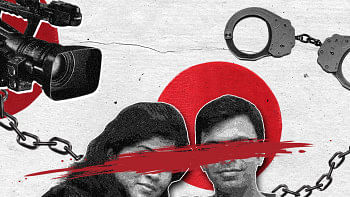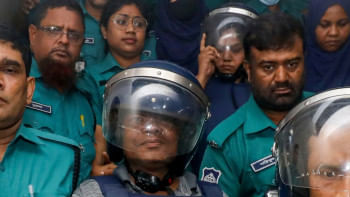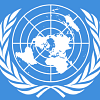A moment for self-reflection

Revolutionary or not, transitions are messy. In Bangladesh, the recent political upheaval has revealed just how deeply entrenched the challenges for the press have been. But it gives us pause to face a harder truth: that the journalist community must take responsibility for its role in a media landscape shaped by fear, restriction and, at times, self-censorship. As we mark the International Day to End Impunity for Crimes against Journalists, this is an opportunity to not only demand justice for the crimes and repression they suffered, but also recognise where journalists have faltered—and where they must do better.
During the Awami League's tenure, the country witnessed escalating restrictions on freedom of speech and a constriction of press freedom. Intimidation, threats and lawsuits became common tools used to stifle dissent, yet these actions did not go unchecked by the media. However, too often, journalists and media institutions were hesitant to confront these injustices outright. Self-censorship—whether to avoid legal repercussions, or retain access to those in power, or simply out of fear—crept into the daily practice of journalism, subtly diluting the role of the press as a check on power. By choosing silence at critical moments or opting for softened critiques, journalism lost much of its power to rally people around the truth, to protect their right to know and, in essence, to protect democracy.
Today, as Bangladesh enters a new phase, our responsibility to confront this culture of silence and promote the practice of speaking fearlessly has never been greater. In the days following the Awami League's fall, journalists have been attacked, threatened and sued in various areas. On August 14, the Chittagong Press Club was stormed, injuring at least 20 journalists. Three days later, two Somoy TV journalists were beaten during protests in Sylhet. Several media houses were attacked and vandalised during that time. These incidents, along with the ongoing assaults and arrests (at times in cases that look suspicious at best), remind us that the cost of pursuing truth can be high, especially in times of political transition.
It is a shame that even as we have ousted a fascist regime after a decade and a half of persecution, coercion and suppression, we have not been able to create a conducive environment where journalists can go about doing their work without fear or favour. Even today, we see journalists being assaulted by criminals, harassed or threatened on social media, or put behind bars, while known criminals are getting out on bail. In the aftermath of August 5, many journalists have remained missing in action. Have they gone into hiding? If yes, why? If not, have they been subjected to enforced silence? We do not know the answer, but this is something worth reflecting about.
The path forward is clear: journalists must step up to fulfil their role with renewed commitment. Journalists today must be both defenders of truth and advocates for change within the profession and in the wider society. Speaking out against abuses and holding power accountable is no longer optional or contingent. It's essential. By doing that, they can reinforce the standards of integrity, courage and transparency that are the cornerstones of a democratic press.
We must remember that journalists are more than just enablers of the fourth estate; they are essentially historians in their own right—recording facts, documenting truth for the future generations to study, and analysing the past. But if we can't be vocal when we should raise our voice, or if we opt for vague narratives when we should point to specifics, we would essentially be playing a role in the distortion of history that our children will identify with us and our actions.
International organisations, including the IFJ, BMSF, and the United Nations Commission on Human Rights, are all calling for journalists' safety and accountability for crimes against the press, but these calls are most powerful when matched by journalists' actions. The interim government has a duty to protect journalists, but we must demand this protection, shoulder-to-shoulder, as we insist upon the right to report and comment freely. Importantly, a media reform commission has been recently formed as part of efforts to introduce much-needed changes in various key sectors. This commission must prioritise the need to uphold the freedom of the press and the security of journalists, so they are able to do their job without fear of unjust repercussions from those with influence.
Transitions, as I already said, are indeed messy, but they bring opportunities for change. Our nation deserves a press that does more than report; it deserves a press that illuminates, empowers, and inspires. To rebuild the trust that has been eroded over the years, journalists must now be part of the solution, creating a culture where speaking truth to power is the expectation, not the exception.
The time for action is now. Let us confront our past shortcomings and rise to the challenge ahead. The people of Bangladesh deserve better journalism, and we owe it to them to be fearless in this pursuit.
Tasneem Tayeb is a Bangladesh-based writer. Her X handle is @tasneem_tayeb.
Views expressed in this article are the author's own.
Follow The Daily Star Opinion on Facebook for the latest opinions, commentaries and analyses by experts and professionals. To contribute your article or letter to The Daily Star Opinion, see our guidelines for submission.

 For all latest news, follow The Daily Star's Google News channel.
For all latest news, follow The Daily Star's Google News channel. 












Comments